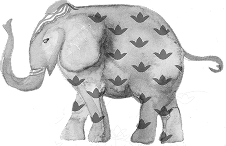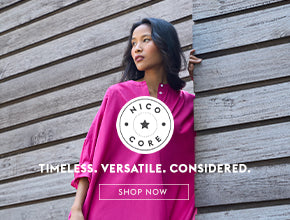WWF x Nicobar
This monsoon we’re collaborating with WWF-India, a non-profit organisation that’s doing some fantastic work in the field of conservation, to spread awareness on marine conservation and to garner support. “We felt the best way to create awareness was through a marine-inspired capsule that’s perfect for gifting”, says Simran Lal, Nicobar’s creative Director, and “WWF-India is an organisation that we all admire for the work they do,” she explains. “From the very start, so much of our work has borrowed from the oceans, travel, and nature in all its forms”, says Divya Kapoor, Nicobar’s Head of Travel Design, but those oceans we’re inspired by, resilient though they may be, are reeling from the effects of human activities — high CO2 emissions, waste mismanagement, and overfishing — that are altering our marine habitat in an alarmingly short span of time. “WWF-India's work focuses on maintaining healthy and resilient marine ecosystems,” Lal continues, “and this collaboration is meant to highlight their ongoing efforts. We urge our customers to play a part."
 Almost 75% of our planet’s surface is covered by the ocean, and those deep waters are a habitat teeming with life. As development moves towards coastal areas and the seas, we’re witnessing human activities that span from deep sea mining and waste mismanagement that negatively impact the oceans and the ecosystem that thrives within. “Partnerships like these go a long way in helping us spread the message of conservation among a larger audience”, says Roopali Srivastava, the Head of Conservation Products at WWF-India. The first leg in a long-term partnership with WWF-India, we’ve designed an ocean-hued capsule that is inspired by the ocean, and part of the proceeds from this line go back to the cause of marine conservation. “A collaboration like ours is very exciting”, says Ema, who heads WWF-India’s Marine Program, “as it allows us to tap into a niche market that we wouldn’t normally have access to.” Organisations like WWF are deeply invested in the work they do, and while they need the government’s support to bring change at a policy level, they’re often side-stepped for more pressing national issues rather than what is considered WWF’s agenda alone. “The point is to generate awareness amongst people, so we have a larger collective voice that cannot be ignored”, finishes Ema.“This collaboration has been extremely exciting for us in respect to the species we’ve focussed on”, Ema continues. Browse through this marine-inspired capsule and you’ll find one of the six endangered species we’re championing on each of these products: the shy Dugong, the acrobatic Devil Ray, brilliantly-coloured coral, the deep-sea navigating Leatherback Turtle, the camouflaging sea horse, and the (extremely intelligent) Humpback Dolphin. Increasingly threatened in their habitat, there’s been a massive increase in the illegal trade of sea horses owing to external demands from the archaic Chinese medicinal market, while sharks are being fished on a large commercial scale to fulfill the demands of the international fin market, and dolphins are being affected by irresponsible tourism activities. “If we don’t urge the government to create policies that will benefit our marine ecosystem, we may lose these species (and others) from Indian waters entirely”, explains Ema.
Almost 75% of our planet’s surface is covered by the ocean, and those deep waters are a habitat teeming with life. As development moves towards coastal areas and the seas, we’re witnessing human activities that span from deep sea mining and waste mismanagement that negatively impact the oceans and the ecosystem that thrives within. “Partnerships like these go a long way in helping us spread the message of conservation among a larger audience”, says Roopali Srivastava, the Head of Conservation Products at WWF-India. The first leg in a long-term partnership with WWF-India, we’ve designed an ocean-hued capsule that is inspired by the ocean, and part of the proceeds from this line go back to the cause of marine conservation. “A collaboration like ours is very exciting”, says Ema, who heads WWF-India’s Marine Program, “as it allows us to tap into a niche market that we wouldn’t normally have access to.” Organisations like WWF are deeply invested in the work they do, and while they need the government’s support to bring change at a policy level, they’re often side-stepped for more pressing national issues rather than what is considered WWF’s agenda alone. “The point is to generate awareness amongst people, so we have a larger collective voice that cannot be ignored”, finishes Ema.“This collaboration has been extremely exciting for us in respect to the species we’ve focussed on”, Ema continues. Browse through this marine-inspired capsule and you’ll find one of the six endangered species we’re championing on each of these products: the shy Dugong, the acrobatic Devil Ray, brilliantly-coloured coral, the deep-sea navigating Leatherback Turtle, the camouflaging sea horse, and the (extremely intelligent) Humpback Dolphin. Increasingly threatened in their habitat, there’s been a massive increase in the illegal trade of sea horses owing to external demands from the archaic Chinese medicinal market, while sharks are being fished on a large commercial scale to fulfill the demands of the international fin market, and dolphins are being affected by irresponsible tourism activities. “If we don’t urge the government to create policies that will benefit our marine ecosystem, we may lose these species (and others) from Indian waters entirely”, explains Ema. “There is a gifting aspect to this entire collection and the Travel products have been designed as a cohesive little capsule for the beach”, smiles Kapoor. You'll find little travel accessories like 'wash' and 'wear' bags that are for laundry as well as for journeys long and short, reusable totes (that will replace your plastic bags), and scarves and pouches that serve well on all sorts of travel (but especially perfect for the beach). In the equally fun Home line, you’ll find jasmine and clove scented candles, small diaries to write in (that have their own little messages for you), sustainably-produced paper-pulp pencils, twinkling barware for entertaining, and more. Look closer, and you’ll find bits in the design that are reminiscent of the sun, sand, and seas like with the striped Oceanic scarf. Peep into the tote and you’ll find an aqua wave print peppered with motifs of marine life and our twinkling barware plays with the forms of corals and turtles. “In terms of design, stamps are iconic to the Travel category, and we’ve really championed our chosen species by making those stamps (and motifs) stand out with a silver foil printing method”, says Kapoor running her gaze over the Deep Sea Diver Tote. “Through this capsule, customers will learn about endangered species, the current state of affairs with our oceans, and will spread that knowledge further if they gift to family and friends”, says Lal explaining the heart of this collaboration and collection.
“There is a gifting aspect to this entire collection and the Travel products have been designed as a cohesive little capsule for the beach”, smiles Kapoor. You'll find little travel accessories like 'wash' and 'wear' bags that are for laundry as well as for journeys long and short, reusable totes (that will replace your plastic bags), and scarves and pouches that serve well on all sorts of travel (but especially perfect for the beach). In the equally fun Home line, you’ll find jasmine and clove scented candles, small diaries to write in (that have their own little messages for you), sustainably-produced paper-pulp pencils, twinkling barware for entertaining, and more. Look closer, and you’ll find bits in the design that are reminiscent of the sun, sand, and seas like with the striped Oceanic scarf. Peep into the tote and you’ll find an aqua wave print peppered with motifs of marine life and our twinkling barware plays with the forms of corals and turtles. “In terms of design, stamps are iconic to the Travel category, and we’ve really championed our chosen species by making those stamps (and motifs) stand out with a silver foil printing method”, says Kapoor running her gaze over the Deep Sea Diver Tote. “Through this capsule, customers will learn about endangered species, the current state of affairs with our oceans, and will spread that knowledge further if they gift to family and friends”, says Lal explaining the heart of this collaboration and collection. “The people who have a connect with Nicobar are people who’re conscious about the planet”, believes Lal, “and our main goal is to create awareness within a group of influential individuals, aligning them with WWF-India’s conservation efforts.” While part of the proceeds from this capsule go directly to WWF-India, customers may want to be involved in immersive conservation activities. There is so much more one can do from donating funds directly to WWF to volunteering for their ongoing work in marine conservation. “Educate yourselves and your children, and be more involved with nature”, urges Ema explaining that knowledge is a prelude to change. Decision-making and responsibility lies with every individual, so as you step out for a meal, ensure that your seafood is obtained from sustainable sources. As a responsible tourist, ensure that your visits are not marred by waste left behind, and you keep a fair distance from the animals to avoid stressing them. Refrain from buying products that are destructive of the marine habitat like coral jewellery, shells, and shell crockery. “People need to be more aware about what they’re using and the impact every product has on our environment”, finishes Ema.
“The people who have a connect with Nicobar are people who’re conscious about the planet”, believes Lal, “and our main goal is to create awareness within a group of influential individuals, aligning them with WWF-India’s conservation efforts.” While part of the proceeds from this capsule go directly to WWF-India, customers may want to be involved in immersive conservation activities. There is so much more one can do from donating funds directly to WWF to volunteering for their ongoing work in marine conservation. “Educate yourselves and your children, and be more involved with nature”, urges Ema explaining that knowledge is a prelude to change. Decision-making and responsibility lies with every individual, so as you step out for a meal, ensure that your seafood is obtained from sustainable sources. As a responsible tourist, ensure that your visits are not marred by waste left behind, and you keep a fair distance from the animals to avoid stressing them. Refrain from buying products that are destructive of the marine habitat like coral jewellery, shells, and shell crockery. “People need to be more aware about what they’re using and the impact every product has on our environment”, finishes Ema.Dip into our new marine-inspired capsule here, and involve yourselves with WWF-India's marine conservation efforts here.





















 GET IN TOUCH
GET IN TOUCH